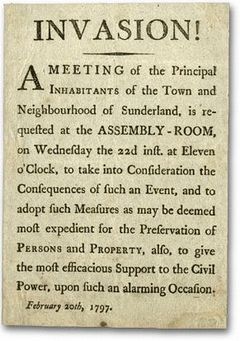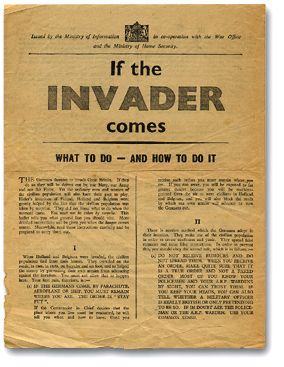 |
|
|
News
About Us
Membership
Events
Links
|
|
One of the early items in the Rickards Collection is a handwritten document from The Proprietors and Tennants of Pitnacree 7th Febry 1797. It is headed ‘Number of ploughs in Pitnacree ’, but the list refers to horses and carts. This is explained by the following statement: ‘We ... make offer to Govemment, free of any expense, of our Carts & Horses, that is one Double Cart & Driver from each plough in Case of Invasion to Convey Troops with their arms & Baggage Twenty miles through our district when ever required so to do ’. The total of carts is seven. This offer illustrates a common factor in times of emergency - a big commitment from a small community. In 1797 fear of invasion from Napoleon’s armies was strong and the Government was encouraging the raising of volunteer corps throughout the kingdom, and appealing for help with transport for the army and the militia. It seems surprising that the people of Pitnacree, located well away from the coast, about four miles from Aberfeldy, south of Pitlochry, should have been seriously worried by the threat of invasion, and believed that their contribution would be of value in such a remote part of the kingdom. It becomes more explicable, however, when one learns that Pitnacree was part of the Duke of Athol’s estates, and that the Duke’s tenantry were particularly active in responding to the national appeal1.  Another item from the Rickards Collection, of the same month and year, is a printed notice calling a meeting of the Principal Inhabitants of the Town and Neighbourhood of Sunderland to ‘take into Consideration the Consequences of such an Event, and to adopt such Measures ... for the Preservation of Persons and Property, also, to give the most effícacious Support to the Civil Power...’ Earnest local historians of that town would no doubt be able to track down the response to that appeal. More detailed information about these preparations comes from another source - family papers at the Hampshire Record Office. The govemment required schedules to be completed for each parish and that for Tunworth, near Basingstoke, shows the ‘Number of Persons between the ages of 15 and 60 willing to serve, and in what capacity, how armed (Cavalry and Infantry), Implements they can bring, those willing to act as Pioneers, Labourers or Guides, and details of servants with cattle or teams. Schedule No 1 asks for the total of men between the ages of 15 and 60, those infirm or incapable of active service, those already serving, aliens, Quakers, and Persons who, from Age, Infancy, Infirmity, or other Cause, may probably be incapable of removing themselves ’. These Schedules were completed and signed by Wm. Waterman, Thythingman [sic], who describes himself three times as ‘above Aige 60 years ’, making his own position clear! The useful implements listed include 1 Felling Axe, 5 Pick-axes, 11 Spades, 6 shovels, 9 Billhooks, & 4 Saws, 6 Hatchets, for a total of 31 men - among whom was listed my ancestor Nathaniel Paice, ‘with teams’. There were no aliens or Quakers in Tunworth then2. Returning to the Rickards papers, there is a draft notice of December 30, 1803, from Hastings, a more vulnerable area than Pitnacree, advising the inhabitants ‘who are rendered incapable of taking an active part in the defence of their country ... to remain at home for the preservation of their lives and property which would be much endangered by any attempt to remove from the Town’, while owners of horses and oxen are told to drive them away over Fairlight Down, and if found near the coast, ‘will be destroy'd, in order that they may not fall into the hands of the enemy and no compensation whatever will be made ... unless they have made their utmost endeavours to conform to these regulations ... All the public roads are to be left free and open for the military ...’ This is an unsigned, handwritten draft, much corrected3. Some eighty years later, Thomas Hardy used similar documents for his novel The Trumpet Major. He quotes an Address to all Ranks and Descriptions of Englishmen ( ‘from an original copy in a local museum’) which asks for volunteers to enter their names on ‘the Lists which are sent to the Tything-men of every Parish, engaging to act either as Associated Volunteers bearing Arms, as Pioneers & Labourers, or as Drivers of Waggons’. This is confírmed by Miller Lovegrove who tells his family that ‘....“a Government man has been here, taking down the numbers of the women and children in case they have to retreat inland, out of the way of the invading army”. The little family gathered themselves together, all feeling the crisis more seriously than they liked to express’4. In setting his novel in the period of the Napoleonic Wars, he drew on ‘recollections of old persons ... who were eye witness of these scenes’, and on ‘casual relics’ - in his case objects - such as ‘an outhouse door riddled with bullet-holes, which had been extemporised by a solitary man as a target for firelock practice when the landing was hourly expected, worm-eaten shafts & iron heads of pikes for the use of those who had no better weapons’5. Newspapers of the time were supplemented with contemporary records of the King’s doings at Weymouth - perhaps not strictly ephemera but in the right spirit! It was a time of alarm and rumour: Hardy describes the ‘minor Englishmen’ veterans of earlier wars, who were keeping watch on the hill, ‘dwelling in a hut of clods and turf’, minding the ricks to be fíred when the enemy was sighted and carrying out their instructions too promptly on a mistaken hearing of guns. JB Priestley, in a radio broadcast in June 1940, chronicled a later emergency, with rather different personnel: ‘The post is on top of high down, with a fine view over a dozen wide parishes. The men I met up there ... represented a good cross-section of English rural life: we had a parson, a bailiff, a builder, farmers and farm labourers’6. Records of World War II have interesting parallels and differences: the government asking for ‘Volunteers ... to go on duty against airborne invasion ... British subjects, between the ages of seventeen and sixty-fíve ... [to be] entrusted with certain vital duties for which reasonable fitness, and a knowledge of firearms [would] be necessary ...’7 When the Local Defence Volunteers refused to admit women, the Amazon Defence Corps was set up with experienced markswomen teaching women - and men - how to fire rifles, and Lady Helene Gleichen forming the employees on her estate into a private army, the ‘Much Marcle Watchers’8. Parish Invasion Committees were formed ‘to draw up precise inventories of things available likely to be of use - horses, carts, trailers, wheelbarrows, ...crowbars, spades, shovels ...paraffin lamps etc’ while one Invasion Defence Officer arranged for an emergency cooking stove and iron rations of tea, sugar and milk for about 300 people resting on their evacuation walk from Nazeing9.  Detailed instructions on civilian behaviour were issued by the Ministry of Information in a 1940 leaflet: ‘If the Germans come ... you must remain where you are. The order is “Stay Put” to avoid clogging the roads and being exposed to aerial attack’. It ends with the patriotic command ‘Think always of your country before you think of yourself’. But in the coastal towns in March 1941 the advice was different ‘all who can be spared and have somewhere to go, to leave without delay’10. In Ventnor, Isle of Wight, a hundred foot gap was cut in the pier to prevent its use by invading forces. A separate, similar, leaflet was prepared for farmers; ‘On farms, the first duty ... is to go on producing all the food possible ... unless military action makes it impossible go on ploughing, cultivating, sowing, hoeing, and harvesting as though no invasion were occurring ...’ Then follows ‘how to put tractors out of action if in danger of their capture by the enemy’11. It is easy to draw entertainment from these and other instructions, and the personnel and activities of the variously named volunteer organisations, in both periods. Fortunately, for Britain, invasion did not become a reality. Notes
Copyright © Diana Mackarill 2004. All Rights Reserved.
|
|
|
Home | News | About Us | Membership | Events | Links | Contact | Item of the month | Articles |
| Copyright © The Ephemera Society 2025. All Rights Reserved. |
